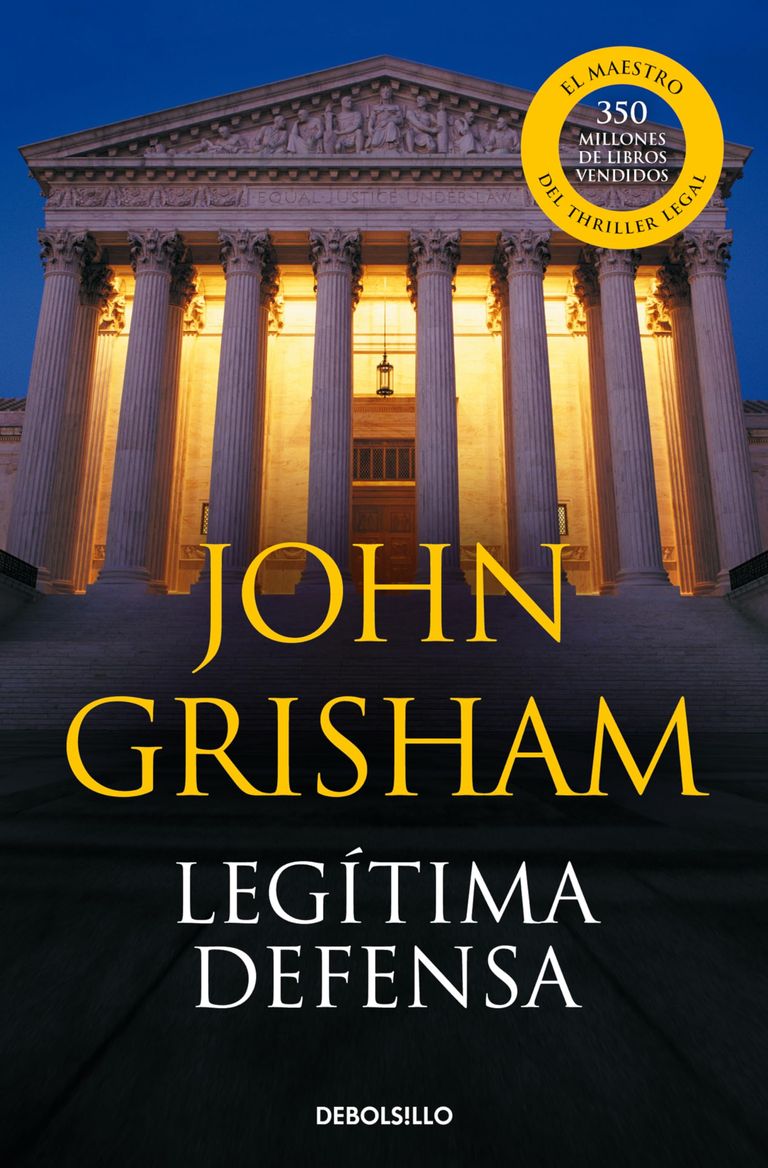
Legítima defensa (en inglés - The Rainmaker) es una novela escrita en 1995 por John Grisham, autor de novelas policíacas.
En 1997 la historia fue llevada al cine en la película The Rainmaker (película), dirigida por Francis Ford Coppola y protagonizada por Matt Damon, Danny DeVito, Claire Danes, Jon Voight y Danny Glover.
Al protagonista, Rudy Baylor, un joven abogado de Memphis, se le presentan dos casos: uno relativo a una anciana que afirma querer donar su patrimonio millonario a un telepredicador, y el segundo relativo a un joven enfermo terminal de leucemia, llamado Donny Ray. Como la compañía de seguros Great Eastern no quiere pagar el trasplante de médula ósea que podría salvar al joven Donny Ray, Rudy Baylor decide, junto con la madre del chico, Dot, demandar a la aseguradora. La compañía Great Eastern despliega un plantel de abogados de primera fila mientras que el joven Rudy sólo tiene de su lado a su ayudante, Deck Shifflet, que se hace pasar por abogado sin haber aprobado nunca el correspondiente examen de abogacía. Paralelamente al juicio, Rudy conoce a una joven, Kelly Riker, víctima de continuos malos tratos por parte de su marido alcohólico, de la que acaba enamorándose impulsado por el deseo de salvarla.

The Rainman (The Rainmaker) is a novel written in 1995 by John Grisham, author of crime fiction.
In 1997 the story was made into the film The Rainmaker (movie), directed by Francis Ford Coppola and starring Matt Damon, Danny DeVito, Claire Danes, Jon Voight and Danny Glover.
The protagonist, Rudy Baylor, a young lawyer from Memphis, is presented with two cases: the first involving an elderly woman who claims she wants to donate her million-dollar estate to a telepredicator, and the second involving a young man terminally ill with leukemia named Donny Ray. Because the Great Eastern insurance company does not want to pay the expenses necessary for the bone marrow transplant that could save young Donny Ray, Rudy Baylor decides together with the boy's mother, Dot, to sue the insurance company. The Great Eastern company deploys a pool of top-notch lawyers while young Rudy has only his assistant, Deck Shifflet, on his side, posing as a lawyer without ever having passed the relevant bar exam. In parallel with the trial Rudy meets a young woman, Kelly Riker, a victim of constant abuse by her alcoholic husband, with whom he ends up falling in love driven by a desire to save her.

Mi decisión de ser abogado se hizo irrevocable cuando me di cuenta de que mi padre odiaba a los abogados. Yo era un adolescente torpe, avergonzado por mi torpeza, frustrado con la vida, aterrorizado por la pubertad y a punto de ser enviado a una escuela militar por mi padre por insubordinación. Era un ex marine convencido de que había que azotar a los chicos. Yo había demostrado una lengua rápida y una aversión a la disciplina, y su solución fue enviarme lejos. Pasaron años hasta que le perdoné.
También era ingeniero y trabajaba setenta horas a la semana para una empresa que, entre otras cosas, fabricaba escaleras. Como las escaleras son peligrosas por naturaleza, la empresa era a menudo objeto de demandas por daños y perjuicios. Y como se encargaba del diseño, solían elegirle para defender los argumentos de la empresa en las declaraciones de los testigos y en los juicios. No puedo culparle por odiar a los abogados; pero había llegado a admirarlos porque le arruinaban la existencia. Se pasaba ocho horas peleándose con ellos y luego se ponía a tomar martinis en cuanto llegaba a casa. Sin despedidas. Sin abrazos. Ni cenas. Sólo una hora de arrebatos mientras engullía cuatro martinis y acababa quedándose dormido en el destartalado sillón. Un pleito duró tres semanas, y cuando terminó con la condena de la empresa a pagar una cuantiosa indemnización, mi madre llamó a un médico, y escondieron a mi padre en el hospital durante un mes.
Más tarde la empresa quebró, y por supuesto toda la culpa fue de los abogados. Ni una sola vez les oí admitir que tal vez una mala gestión pudiera haber contribuido a la quiebra.
El licor se convirtió en la vida de mi padre, que se deprimió. Durante años y años no pudo encontrar un trabajo estable, y eso me volvió loca porque me vi obligada a servir mesas y repartir pizzas para pagarme la universidad. Creo que no hablé con él más de dos veces en los cuatro años que pasaron desde su graduación. Al día siguiente de enterarme de que me habían aceptado en la facultad de Derecho, llegué a casa muy orgulloso y le conté la gran noticia. Más tarde, mi madre me dijo que mi padre llevaba una semana en cama.
Quince días después de mi visita triunfal, mi padre estaba cambiando una bombilla en la sala de calderas cuando (juro que es verdad) la escalera cedió, se cayó y se golpeó la cabeza. Estuvo un año en coma en un hospital de crónicos hasta que alguien tuvo la misericordiosa idea de desconectarlo.
Unos días después del entierro insinué la posibilidad de demandar, pero mi madre no se sentía con ánimos. Además, siempre sospeché que mi padre estaba medio borracho cuando se cayó. Tampoco ganaba dinero, así que, según nuestras leyes sobre daños y perjuicios, su vida tenía poco valor económico.
Mi madre recibió los cincuenta mil dólares del seguro de vida y se volvió a casar. Un mal matrimonio. Mi padrastro es un tipo muy sencillo, un empleado de correos jubilado de Toledo. Pasan la mayor parte del tiempo bailando en la plaza y dando vueltas en una Winnebago. Yo me mantengo alejado. Mi madre no me ofreció ni un céntimo de seguro: decía que lo necesitaba para afrontar el futuro y como yo había demostrado que era capaz de vivir con nada, estaba convencida de que no lo necesitaba. Yo tenía un futuro brillante que prometía ricas ganancias, ella no. Estoy seguro de que Hank, su nuevo marido, le llenó la cabeza de consejos financieros. Algún día, mi camino y el de Hank volverán a cruzarse.
Terminaré la carrera de Derecho dentro de un mes, en mayo, y en julio haré el examen de abogacía. No será una licenciatura con honores, aunque quede en la mitad superior de la clasificación de mi clase. Lo único inteligente que hice en mis tres años en la facultad de Derecho fue programar con antelación los exámenes obligatorios más difíciles para tomármelo con calma en el último semestre. Las clases de esta primavera son una broma: Derecho deportivo, Derecho del arte, Lecturas escogidas del Código Napoleónico y mi asignatura favorita, Problemas jurídicos de las personas mayores.
Precisamente por esta última elección estoy aquí ahora, en una silla tambaleante detrás de una endeble mesa plegable en un edificio caluroso y húmedo lleno de una extraña variedad de ciudadanos de la tercera edad, como les gusta llamarse a sí mismos. Un cartel pintado a mano sobre la única puerta visible denomina pomposamente el lugar «Edificio de la tercera edad Cypress Gardens», pero no hay ni la sombra de un ciprés ni de otras plantas. Las paredes son grisáceas y desnudas, salvo por una vieja y descolorida foto de Ronald Reagan, de pie en una esquina entre dos pequeñas banderas lúgubres, la nacional y la del estado de Tennessee. El edificio es pequeño y lúgubre, y enseguida se ve que lo levantaron en un santiamén con los pocos dólares de una inesperada asignación federal. Garabateo en un bloc de notas y no me atrevo a mirar a la multitud que se acerca lentamente, arrastrando sillas plegables tras de sí.
Debe de haber unos cincuenta, blancos y negros en número más o menos igual, con una media de edad no inferior a los setenta y cinco años: algunos son ciegos, diez o doce van en silla de ruedas, muchos llevan audífonos. Nos contaron que acuden todos los días a mediodía para comer algo caliente, escuchar algunas canciones y, de vez en cuando, recibir la visita de algún candidato político sin muchas esperanzas. Después de estar juntos un par de horas se van a casa y cuentan los minutos hasta que pueden volver. Nuestro profesor dice que es el acontecimiento más esperado de su día.
Cometimos el error de llegar a tiempo para el almuerzo. Nos sentaron a los cuatro en un rincón con nuestro guía, el profesor Smoot, y nos observaron atentamente mientras mordisqueábamos pollo neopreno y guisantes fríos. Mi gelatina era amarilla, y el detalle le llamó la atención a una vieja cabra con el apellido Bosco garabateado en la etiqueta «Hola, me llamo» prendida en el bolsillo de su camisa sucia. Bosco murmuró algo sobre la gelatina amarilla e inmediatamente se la ofrecí junto con el pollo, pero la señora Birdie Birdsong se lo impidió y le empujó bruscamente hacia su asiento. La señora Birdsong tiene más de ochenta años, pero es muy ágil para su edad y actúa como la madre, la dictadora y la portera de la organización. Trabaja con la multitud como la veterana jefa de un comité electoral, repartiendo abrazos y palmaditas en la espalda, charlando con otras ancianas de pelo azul, riendo con voz chillona y mientras tanto vigilando a Bosco, que evidentemente es la oveja negra de la manada. Le sermoneó porque admiraba mi gelatina, pero al cabo de unos segundos le puso delante un cuenco lleno de masilla amarillenta. Bosco se la comió con dedos rechonchos y le brillaron los ojos.
Pasó una hora. El almuerzo transcurrió como si aquellas hambrientas criaturas estuvieran asistiendo a un banquete de siete platos sin esperanza de otra comida. Los temblorosos tenedores y cucharas iban y venían, subían y bajaban, entraban y salían como si estuvieran cargados de metales preciosos. El tiempo no tenía la menor importancia. Alternaban sus voces estridentes cuando alguna palabra les excitaba. Se les caía la comida al suelo y llegó un momento en que no pude mirar más. Incluso me comí mi gelatina. Bosco observaba con avidez todos mis movimientos. La señora Birdie revoloteaba de un lado a otro y chirriaba sobre este y aquel tema.
El profesor Smoot, el tipo académico tradicional con pajarita, pelo alborotado y tirantes rojos, permanecía de pie con el aire saciado y satisfecho de quien acaba de terminar una deliciosa comida, y contemplaba la escena con cariño. De unos cincuenta años, es un hombre apacible, pero de modales muy parecidos a los de Bosco y sus amigos. Lleva veinte años impartiendo asignaturas que nadie está dispuesto a enseñar, a las que asisten muy pocos alumnos. Derecho del Menor, Legislación para Minusválidos, Seminario de Violencia Doméstica, Problemas de los Enfermos Mentales y, por supuesto, 'Derecho Arterial', como se llama este último cuando él no está presente. En una ocasión había programado un curso que iba a llamarse Derechos del feto, pero había desatado tal tormenta de controversia que Smoot se apresuró a tomarse un año sabático.
El primer día de clase explicó que el propósito de su curso era presentarnos a personas reales con problemas jurídicos reales. Está convencido de que todos los estudiantes que van a la facultad de Derecho tienen cierto idealismo al principio y desean servir a la gente; pero después de tres años de competencia brutal, lo único que nos importa es que nos contraten en un bufete de abogados donde podamos convertirnos en socios en siete años y ganar mucho dinero. En esto tiene razón.

My decision to be a lawyer became irrevocable when I realised that my father hated lawyers. I was an awkward teenager, embarrassed by my clumsiness, frustrated with life, terrified of puberty and about to be sent to a military school by my father for insubordination. He was an ex-marine, convinced that boys should be whipped. I had demonstrated a quick tongue and an aversion to discipline, and his solution was to send me away. Years passed before I forgave him.
He was also an engineer and worked seventy hours a week for a company that, among other things, manufactured ladders. Since ladders are by nature dangerous, the company was often the target of lawsuits for damages. And because he was in charge of design, he was routinely chosen to argue the company's case in witness statements and trials. I cannot blame him for hating lawyers; but I had come to admire them because they ruined his existence. He would spend eight hours fighting with them, then jump on martinis as soon as he got home. No goodbyes. No hugs. No dinner. Just an hour of stymied outbursts as he guzzled four martinis and ended up falling asleep in the shabby armchair. A lawsuit lasted three weeks, and when it ended with the company being ordered to pay a hefty compensation, my mother called a doctor, and they hid my father in the hospital for a month.
Later the company went bankrupt, and of course all the blame lay with the lawyers. Not once did I hear them admit that perhaps mismanagement might have contributed to the bankruptcy.
Liquor became my father's life, and he became depressed. For years and years he couldn't find a steady job, and this drove me crazy because I was forced to wait tables and deliver pizzas to pay my way through college. I don't think I spoke to him more than twice in the four years since graduation. The day after I heard that I had been accepted to law school, I came home all proud and told him the great news. Later, my mother told me that my father had been in bed for a week.
Fifteen days after my triumphal visit, my father was changing a light bulb in the boiler room when (I swear it's true) the ladder gave way, he fell and hit his head. He was in a coma for a year in a chronic hospital before someone had the merciful idea of pulling the plug.
A few days after the funeral I hinted at the possibility of suing, but my mother didn't feel up to it. Besides, I always suspected that my father was half drunk when he fell. He also did not earn any money, so according to our laws on damages, his life had little financial value.
My mother received the fifty thousand dollars from the life insurance and remarried. A bad marriage. My stepfather is a very simple guy, a retired postal worker from Toledo. They spend most of their time square dancing and riding around in a Winnebago. I stay away. My mother didn't offer me a penny of insurance: she said she needed it to face the future and since I had shown I was capable of living on nothing, she was convinced I didn't need it. I had a bright future that promised rich earnings, she did not. I am sure Hank, her new husband, filled her head with financial advice. Someday, my path and Hank's will cross again.
I will finish law school in a month, in May, and in July I will take the bar exam. It won't be an honours degree even if I place in the top half of my class rankings. The only smart thing I did in my three years at law school was to schedule the most difficult compulsory exams in advance to take it easy in the last semester. This spring's classes are a joke: Sports Law, Art Law, Selected Readings from the Napoleonic Code and my favourite subject, Legal Problems of the Elderly.
It is precisely because of this last choice that I am here now, in a wobbly chair behind a flimsy folding table in a hot and humid building filled with a bizarre assortment of senior citizens, as they like to call themselves. A hand-painted sign above the only visible door pompously labels the place the ‘Cypress Gardens Senior Citizens Building’, but there is not even a shadow of a cypress tree or other plants. The walls are greyish and bare, except for a faded old photo of Ronald Reagan standing in the corner between two mournful little flags, the national flag and the Tennessee state flag. The building is small and dreary, and it is immediately apparent that it was pulled up in no time with the few dollars from an unexpected federal appropriation. I scribble on a notepad and dare not look at the crowd slowly approaching, pulling folding chairs behind them.
There must be about fifty of them, black and white in more or less equal numbers, with an average age of no less than seventy-five: some are blind, ten or twelve are in wheelchairs, many have hearing aids. They told us they come every day at noon for a hot meal, a few songs, the occasional visit from a political candidate without much hope. After being together for a couple of hours they go home and count the minutes until they can return. Our professor says it is the most anticipated event of their day.
We made the mistake of arriving in time for lunch. They sat all four of us in a corner with our guide, Professor Smoot, and watched us carefully as we nibbled on neoprene chicken and cold peas. My jelly was yellow, and the detail was noticed by an old goat with the surname Bosco scribbled on the ‘Hello, my name is’ tag pinned to his dirty shirt pocket. Bosco mumbled something about the yellow jelly and I immediately offered it to him along with the chicken, but Mrs Birdie Birdsong blocked him and abruptly pushed him back in his seat. Mrs Birdsong is in her eighties but she is very spry for her age and acts like the mother, the dictator and the bouncer of the organisation. She works the crowd like the veteran head of an election committee, distributing hugs and pats on the back, chatting with other blue-haired old ladies, laughing in a squeaky voice and meanwhile keeping an eye on Bosco, who is evidently the black sheep of the pack. She lectured him because he admired my jelly, but after a few seconds she put a bowl full of yellowish putty in front of him. Bosco ate it with stubby fingers, and his eyes glistened.
An hour passed. Lunch proceeded as if those hungry creatures were attending a seven-course banquet with no hope of another meal. The quivering forks and spoons went back and forth, up and down, in and out as if laden with precious metal. Time had not the slightest importance. They alternated in shrill voices when some word excited them. They would drop their food on the floor and at one point I couldn't watch anymore. I even ate my jelly. Bosco eagerly watched my every move. Mrs Birdie fluttered to and fro and chirped on this and that subject.
Professor Smoot, the traditional academic type complete with bow tie, bushy hair and red braces, stood there with the satiated and satisfied air of someone who has just finished a delicious meal, and lovingly contemplated the scene. In his early fifties, he is a mild-mannered man, but with manners very similar to those of Bosco and his friends. For twenty years he has been teaching subjects that no one else is willing to teach, attended by very few students. Child Law, Legislation for the Handicapped, Domestic Violence Seminar, Problems of the Mentally Ill and, of course, ‘Arterial Law’, as the latter is called when he is not present. He had once scheduled a course that was to be called Rights of the Foetus, but it had triggered such a storm of controversy that Smoot had hastened to take a sabbatical.
On the first day of class he explained that the purpose of his course was to introduce us to real people with real legal problems. He is convinced that all students who go to law school have a certain amount of idealism at first and wish to serve the people; but after three years of brutal competition, the only thing we care about is getting hired at a law firm where we can become partners in seven years and earn a lot of money. In this he is right.

Legítima Defensa es la historia de cómo los grandes poderes (en este caso representados por una compañía de seguros) se aprovechan de la buena fe de personas incultas y sumisas. Fue realmente divertido seguir a este novato imberbe en su trabajo, viéndole desenmascarar las intrigas, el modus operandi y las hipocresías de la compañía de seguros. Cada golpe a los fanfarrones del otro bando me hacía regodearme.
No sólo eso, sino que la vena irónica de Grisham hace que la parte del juicio sea aún más irresistible. Te parece ver la alineación de abogados defensores, todos pavoneándose y pavoneándose con sus maletines y sus trajes almidonados, dirigidos por un magnate de la abogacía. Y la escena en la que el director general de la empresa acusada se ve obligado a leer la minúscula cláusula de la póliza que él mismo aprobó es memorable.Un libro un poco lento al principio, pero que poco a poco se vuelve más atractivo y emocionante. Las últimas 200 páginas se leen de un tirón. En algunos aspectos, sin embargo, el libro se parece más a un «thriller fantástico» que a un «thriller jurídico». Ah, sí, porque de hecho el realismo de la historia se sostiene. Si uno piensa en el sistema judicial italiano, parece imposible que un juicio pueda celebrarse en una semana... y aún más improbable es que el caso lo lleve un abogado recién licenciado, solo, sin un bufete que le «cubra las espaldas» y sin ningún tipo de preparación sobre cómo comportarse ante un tribunal. Sin duda, pero también muy afortunado es nuestro joven protagonista: sin ni siquiera pedírselo, surgen ayudas y pruebas que clavan a la otra parte. En resumen, por la forma en que Grisham lo describe, parece que sería fácil abrir tu propio bufete de abogados y demandar a una gran corporación... ¡pero por desgracia la realidad es bien distinta! Realismo aparte, The Rain Man es uno de esos libros que atrapan la atención del lector página tras página, conduciéndole hacia un final inesperado y sorprendente.

The Rainmaker is the story of how great powers (in this case represented by an insurance company) take advantage of the good faith of uneducated and submissive people. It was a real hoot to follow this beardless rookie at work, watching him expose the insurance company's intrigues, modus operandi and hypocrisies. Every swipe at those blowhards on the other side really made me gloat.
Not only that, but Grisham's wry streak makes the trial part even more irresistible. You seem to see the lineup of defense attorneys, all strutting and pulled together in their briefcases and starched suits, led by a legal business tycoon. And the scene in which the chief executive of the firm under indictment is forced to read the tiny clause on the policy he himself approved is memorable.A somewhat slow book at first but it gradually becomes more engaging and exciting. The last 200 pages are read all in one breath. In some respects, however, the book reads more like a “fantasy-thriller” rather than a “legal-thriller.” Oh yes, because in fact the realism of the story holds water. If one thinks of the Italian justice system, it seems impossible for a trial to take place in a week ... and even more improbable is that debating the case is a newly graduated lawyer, alone, without a law firm to “cover his back,” and without any kind of preparation on how one should behave in the courtroom. Launched no doubt, but also very lucky our young protagonist: without even being asked, aids and evidence pop up that nail the opposing side. I mean, from the way Grisham describes it, it sounds like it would be easy to open your own law firm and sue a big corporation ... but unfortunately the reality is quite different! Realism aside, The Rain Man is one of those books that grabs the reader's attention page after page, leading them to an unexpected and surprising ending.

Traducción efectuada con: / Translated with: DeepL.com/Translator (free version)
Fuente imágenes / Source images: John Grisham Official Website.
El crédito por las imágenes de los divisores e imagen final va a YoPriceGallery. y a UnsplashLos he modificado usando el programa de distribución libre y gratuita Kolour Paint. / Credit for the images of the dividers and final image goes to YoPriceGallery and UnsplashI modified them using the freely distributed Kolour Paint.



| Blogs, Sitios Web y Redes Sociales / Blogs, Webs & Social Networks | Plataformas de Contenidos/ Contents Platforms |
|---|---|
| Mi Blog / My Blog | Un Libro de Cabecera. |
| Mi Blog / My Blog | Rasetipi. |
| Red Social Twitter / Twitter Social Network | @hugorep |
